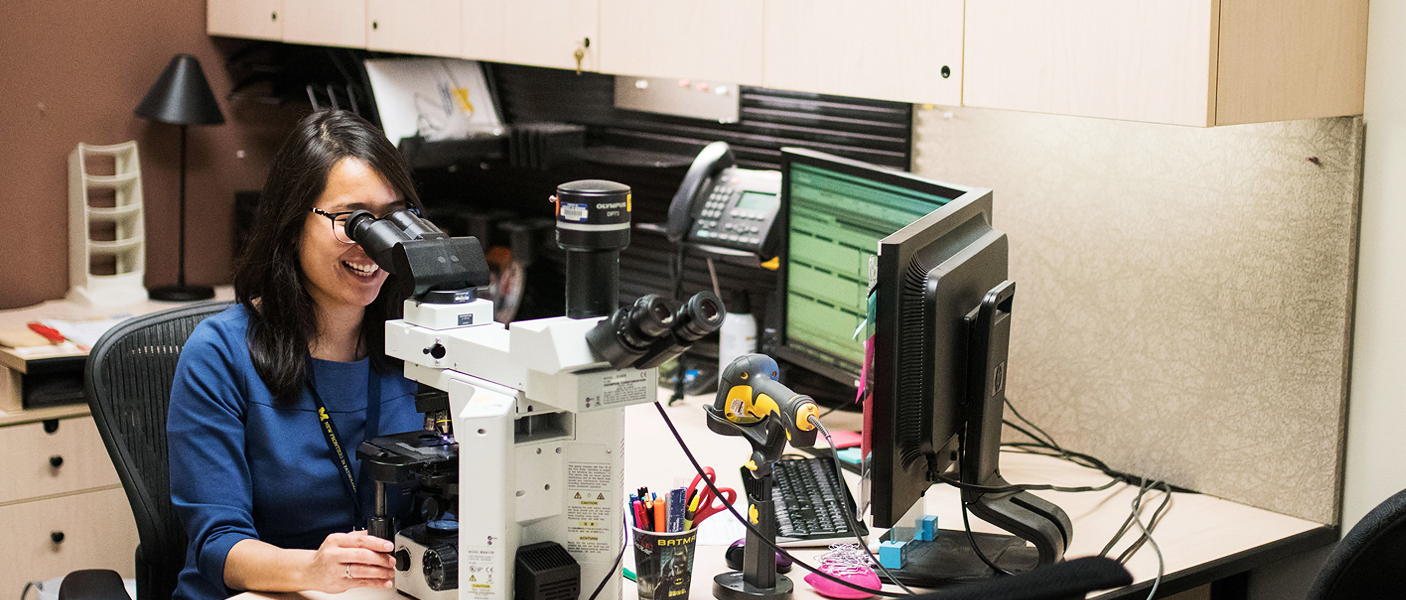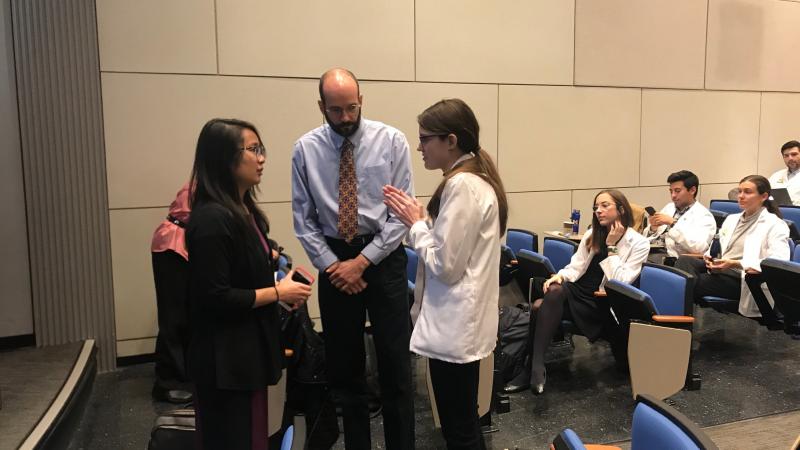

medicine.umich.edu | 17 December
 Dr. Lew (left) talking with an M1 student before a recent Patient Presentation.Madelyn Lew, MD is a fan favorite among Michigan Medical School students. Her style of interactive lectures on pathology and her drive to connect students in the Branches to the passions that brought them into medicine in the first place are just a couple of reasons why. Dr. Lew is primarily a cytopathologist in the department of Pathology. She is the Director of Medical School Pathology Education Curriculum for her department, and helped oversee recent major changes in the delivery of pathology content in the Scientific Trunk and developed curricula in newer aspects of the curriculum, including Transitions to Clerkships and a new week-long pathology rotation embedded into the new Surgery Clerkship. She also serves as a Branch advisor and sequence director for the Foundations of Diagnostics & Therapeutics Branch and lectures in the Endocrine sequence. Somehow she still finds time for her favorite hobby: snowboarding! Here, she answers 10 questions about all of her roles, in and outside of medical school.
Dr. Lew (left) talking with an M1 student before a recent Patient Presentation.Madelyn Lew, MD is a fan favorite among Michigan Medical School students. Her style of interactive lectures on pathology and her drive to connect students in the Branches to the passions that brought them into medicine in the first place are just a couple of reasons why. Dr. Lew is primarily a cytopathologist in the department of Pathology. She is the Director of Medical School Pathology Education Curriculum for her department, and helped oversee recent major changes in the delivery of pathology content in the Scientific Trunk and developed curricula in newer aspects of the curriculum, including Transitions to Clerkships and a new week-long pathology rotation embedded into the new Surgery Clerkship. She also serves as a Branch advisor and sequence director for the Foundations of Diagnostics & Therapeutics Branch and lectures in the Endocrine sequence. Somehow she still finds time for her favorite hobby: snowboarding! Here, she answers 10 questions about all of her roles, in and outside of medical school.
What do you see as your overall purpose/mission when it comes to shaping future physician leaders?
I want to instill in them a passion for what they are going into. Sometimes, going through all the requirements and obstacles in medical school makes it difficult to get through the grind without losing what got you interested in medicine to begin with. I try to help maintain or reignite their fascination with medicine - encouraging students to keep asking questions and probing, learning but still not being satisfied with the answers as the “end all be all.”
What are your strategies for engaging med students in the content you are teaching?
In M1 year where it's didactic lectures, it's a little bit harder to do that. I try to create a more conversational lecture where I ask questions to get students to engage with the information and question it and then, hopefully, pick it apart as they are getting it rather than just accepting what I’m saying at face value.
That's different from my role as a Branch advisor in the M3 and M4 years, where I get more of an opportunity to understand the inner workings of one person and try to align them with opportunities that they might not even know are available to them. As a Branch advisor, I hope to realign my advisees’ interests back to their initial passion after their challenging clerkship year.
As part of the recent MD curriculum transformation, you oversaw some of the major changes in the pathology curriculum. What changed and how have these changes improved the experience for med students?
With the transformation of the didactic curriculum from about 18 months to 12, we had to re-evaluate the pathology material we presented in the first year as well as the way we delivered it. The pathology content was streamlined to cover foundational concepts, but is delivered in a much more succinct and interactive way. We now utilize different technological platforms to transform the otherwise more lecture-like labs to more interactive learning sessions where students can engage with the material more. My hope with using a more interactive presentation is that student learning will be optimized as students critically think about new information at the point that they are presented with it. This is still a work in progress, and I hope to use more technological platforms to present pathology content in the rest of the M1 fused sequences.
One of the biggest changes for the Pathology Department takes place during the Clinical Trunk year. There is a now week-long rotation in pathology during the Surgery & Applied Sciences clerkship. I designed a curriculum so that students who rotate here can see different facets of both anatomic and clinical pathology in the clinical environment and in small group sessions. I am very excited about this, as this rotation gives students the opportunity to see what different pathologists do in clinical settings, which they might not otherwise get a chance to experience elsewhere.
How critical was student input during this process?
It is critical to touch base with students to see if the delivery of pathology content was effective. Their input is incredibly important. They can tell me if they learned or didn't learn what I was expecting them to, and what ways might be more effective to engage more students.
What do you like about your different roles as an educator?
As a lecturer, nothing gives me greater pleasure than seeing a light bulb of realization come across a student's face when they are confused about something and then suddenly understand it. That is one of the most rewarding things I can think of.
When it comes to mentoring, it’s incredibly rewarding to see students take flight into their chosen career paths. Helping and watching students reconnect to what made them passionate about medicine in the first place, and helping them optimize their chances of success in new, innovative ways is always exciting.
Has interacting with med students in your various roles reminded you of what your personal journey was like in becoming a physician?
I had a wonderful mentor in my medical school who was a pathologist. I adored how he taught pathology with sincere passion. Although I really enjoyed learning pathology and admired my mentor, I kept moving along my journey into clinical rotations with my original goal of being a thoracic surgeon.
It wasn't until I was in the middle of my surgery rotation that I really understood how much I love pathophysiology. I realized how much I enjoyed asking and answering the “whys” of a disease process and presentation and evaluating specimens grossly - so much so, that I often found myself following surgical resection specimens out of the operating rooms into the frozen section laboratory. It was then that I reflected back on what I truly enjoyed in medicine and what I wanted to be in my career. I thought about my mentor and realized that he represented not only what I wanted to be professionally (a pathologist) but personally (a passionate educator who truly cared about his students’ professional and personal development) as well. So when I get to mentor students now, I’m reminded of and inspired by my mentor and the impact he had on me, and I hope that one day, I can be that for another student.
What are you looking forward to accomplishing in these roles in the future?
Enhancing students’ understanding of how pathology plays a role in the larger clinical picture of health care delivery. A lot of times pathology is the "black box" of medicine: you ask a question and an answer comes out, and people don't understand the inner workings of what the process of getting that answer looks like and what it could look like as a potential career for them.
What are some of the characteristics that describe students who come to Michigan?
They are incredibly inquisitive and well-rounded. You have everything from art history and music majors to biology majors. The sheer amount of talent and broad interests that our students have never ceases to amaze me.
What do you like to do outside of the med school?
I love snowboarding whenever I get the chance. I also live to eat and will travel far in search of new restaurants. I generally love outdoor activities: hiking, biking, kayaking - anything that gets me outdoors and playing, I am a fan of.
What is your advice to a prospective student who is considering the University of Michigan Medical School for their medical education?
Just keep an open mind. You come into medical school with potential preconceived notions of what you like and what you are good at, and I think that people who keep an open mind might be pleasantly surprised by the vast array of opportunities that will arise just by keeping all the doors open.
The new curriculum gives students a lot more time to explore who they are, especially after their clinical rotations, to make a more comprehensive decision of what they will pursue for the rest of their career. This is something unique that I don't see in many other institutions.